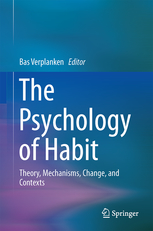The Psychology of Habit was edited by Prof. Verplanken and was recently published by Springer. Sanne contributed a chapter on the role of habits in maladaptive behaviour and in therapeutic interventions, focusing specifically on the use of implementation intentions to break unwanted habits and form new, more desirable habits.

From the publisher’s site: This unique reference explores the processes and nuances of human habits through social psychology and behavioral lenses. It provides a robust definition and theoretical framework for habit as well as up-to-date information on habit measurement, addressing such questions as which mechanisms are involved in habitual action and whether people can report accurately on their own habits. Specialized chapters pay close attention to how habits can be modified, as well as widely varying manifestations of habitual thoughts and behaviors, including the mechanisms of drug addiction and recovery, the repetitive characteristics of autism, and the unwitting habits of health professionals that may impede patient care. And across these pages, contributors show the potential for using the processes of maladaptive habits to replace them with positive and health-promoting ones. Throughout this volume attention is also paid to the practice of conducting habit research.
For more information, visit the Springer site
Reference: Verhoeven, A.A.C. & de Wit, S. (2018). The role of habits in maladaptive behaviour and therapeutic interventions. In Verplanken, B. (Ed.), The psychology of habit: Theory, mechanisms, change, and contexts. Cham: Springer
